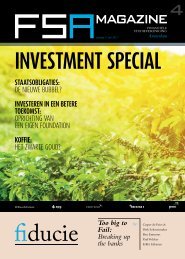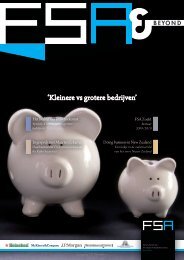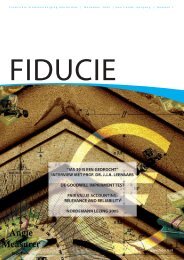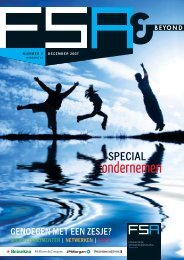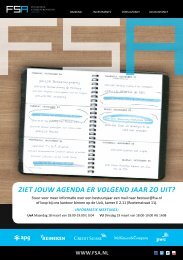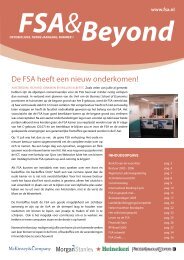Create successful ePaper yourself
Turn your PDF publications into a flip-book with our unique Google optimized e-Paper software.
68 article Philip Wallage<br />
encompasses a range of financial institutions<br />
and a new ‘Large PIE’ category<br />
(broadly listed companies with a market<br />
capitalisation, or relevant financial<br />
institutions with a balance sheet/assets<br />
under management, in excess of €1 billion).<br />
Given the greater societal implications<br />
of large listed companies and financial<br />
institutions certain concerns are<br />
more acute for the audit of large PIEs:<br />
The expectation gap between what stakeholders<br />
expect of an audit and what auditors<br />
actually do. Many have asked the<br />
question of how banks could fail only<br />
months after they had been given clean<br />
audit reports. Moreover, according to<br />
the Commission there is a distinct lack<br />
of communication between auditors and<br />
supervisors regarding apparent weaknesses<br />
in the financial solidity of audited<br />
entities, in particular in the financial<br />
sector.<br />
Independence is neither assured nor demonstrable<br />
in a paradigm where audit<br />
has effectively become one of a plethora<br />
of commercial services provided by auditors<br />
to their clients. In the view of the<br />
Commission the lack of regular tendering<br />
of audit services and periodic rotation<br />
of audit firms has deprived audit of<br />
its key ethos: professional scepticism.<br />
According to the Commission in the<br />
current landscape, a large number of<br />
audited companies have effectively become<br />
comfortable with their auditor;<br />
this is a refutation of the very essence of<br />
independence.<br />
Market concentration and lack of choice.<br />
The market is concentrated. In the majority<br />
of Member States, the Big Four<br />
audit more than 85% of large listed companies.<br />
The ‘comfort’ factor amongst<br />
audited companies with their auditors<br />
combined with the perceptions in the<br />
market place have entrenched the predominance<br />
of the Big Four. There is reticence<br />
with regard to engaging non Big<br />
Four auditors even in the relatively rare<br />
occurrence of a tender for audit. The<br />
combination of the above problems im-<br />
plies that investors and other stakeholders<br />
are unable to unreservedly trust the<br />
complete independence, and therefore<br />
quality of the audit opinion.<br />
The EU proposals (consisting of a Directive<br />
and Regulation) have two main<br />
thrusts:<br />
1 Reducing concentration in the market<br />
for audits with new requirements imposed<br />
for audit tendering and auditor<br />
appointment; and<br />
2 Addressing perceived threats to auditor<br />
independence, such as long tenure<br />
and non-audit services, by mandating<br />
audit firm rotation and imposing<br />
significant new limits on non-audit<br />
services, and requiring the largest networks<br />
to be composed of audit-only<br />
firms within the EU.<br />
kEy pRopoSalS<br />
Below, proposals that could significantly<br />
impact the current audit market are<br />
sketched. Some of the proposals seem to<br />
be rational and can strengthen the quality<br />
of the audit in the strive to prevent<br />
financial crises in future, others seem to<br />
be less rational and primarily focused on<br />
reducing concentration in the audit market.<br />
The current audit market is highly<br />
competitive and the negative effects of<br />
concentration –implicitly assumed in the<br />
Barnier proposals- are not clearly linked<br />
to the objective of improving the quality<br />
of audits. Further research should analyze<br />
this (perceived) relationship, as only anecdotal<br />
evidence exists.<br />
Mandatory audit firm rotation<br />
Under the Regulation, the auditor of a<br />
PIE would have to be appointed for at<br />
least two but no more than six years. The<br />
maximum appointment term would be<br />
nine years if there were joint auditors for<br />
the entire period. There is a limited ability<br />
to obtain permission to extend appointment<br />
terms in exceptional circumstances.<br />
In most EU countries, this proposal<br />
would represent an important change<br />
with important cost implications due<br />
both to the frequent rotation of audit<br />
firms and also the tendering requirements<br />
noted below. It might also prevent<br />
the Audit Committee from selecting the<br />
audit firm that they believe is most capable,<br />
and could potentially be detrimental<br />
to audit quality.<br />
Mandatory tendering for appointing auditors<br />
The Audit Committee of a PIE would be<br />
required to identify at least two choices,<br />
unless it is proposing reappointment of<br />
the incumbent auditor (subject to the<br />
maximum six or nine year tenure described<br />
above). It would identify which<br />
firm it preferred and would have to provide<br />
a justification of its recommendation.<br />
At least one of the firms invited to<br />
tender at the start of the process must be<br />
a smaller firm, i.e. one that has less than<br />
a 15% share of the audit fees of large<br />
PIEs in that member state. The Regulation<br />
contains specific requirements for<br />
the process that the Audit Committee<br />
must follow. EU-level regulatory bodies<br />
would also develop further guidelines<br />
on the process for auditor selection.<br />
Auditor appointments for credit institutions<br />
or insurance undertakings would<br />
be subject to a veto right of the relevant<br />
prudential supervisory authority.<br />
Restrictions on non-audit services<br />
Under the Regulation, there would be<br />
few non-audit services that could be<br />
provided by the audit firm or other firms<br />
within the audit firm’s network to a PIE<br />
or its parent/subsidiaries within the EU.<br />
Permitted ‘related financial audit services’<br />
would be limited to:<br />
- audits and reviews of interim financial<br />
statements;<br />
- assurance on regulatory reporting by<br />
financial institutions;<br />
- certification on compliance with tax<br />
requirements when such attestation is<br />
required by national law; and<br />
- assurance on corporate governance<br />
and social responsibility statements.<br />
However, the fees for related financial<br />
audit services to an audit client would be<br />
limited to only 10% of the audit fees paid



